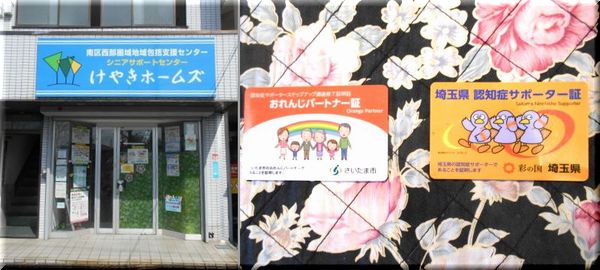
Many people are now entering the era of getting dementia, with Alzheimer’s-type dementia accounting for 70-80% of cases. Understanding and caring for those around them, including family members, hospital doctors and nurses, and many others, is important because many cannot be hospitalized (which is also a problem).
SUCHITOO has been volunteering at a nursing home for about 15 years and actively attends training sessions to learn more. The first session was five years ago, but since then, there have been stepped-up training sessions hosted by the Saitama Psychiatric and Neurological Center, which was probably heavily sought after, as previous sessions had a lottery system due to high demand. However, this time the number of participants limit increased to 50, so they were able to attend.
It was a rigorous 4.5-hour “appeal” given in two curriculum sessions. In this era where the administration alone cannot do everything, the appeal is necessary! This is why the sub-organization of the Regional Comprehensive Support Center was seeking volunteers from citizens interested in supporting the activities related to dementia, not just individuals with dementia and their families. The government uses our taxes and supports these activities indirectly. The justification for the program is targeting groups such as “pregnant women,” “housewives,” and “retirees.” While some aspects are understandable, some are not.
“Even so, I wanted to participate because the number of people with dementia is increasing, so I want to support them. In Thailand, a guy who’s been living there for 20 years is a heavy drinker. He seems to have Lewy body dementia, so I want to give him advice and care. Also, a travel companion who lives in Japan has severe memory loss and once went to the wrong station for a meeting. These days, they haven’t responded to letters or emails completely, but there is still answering the phone (they were diagnosed with dementia after cancer surgery). Due to the pandemic, volunteering for Tai Chi has been canceled, but over half of the participants in the day service are people with mild dementia who don’t remember my face or name. Once, when I called out to someone, they said, ‘The teacher hasn’t come yet,’ which was disappointing. Although there’s a chance I might develop dementia myself, as long as I have time and energy, I want to volunteer and support them.”
During the group discussions in the two training sessions, some good opinions were raisong, such as “People with dementia should be eligible for a disability certificate,” “Care such as taxi transfer should be provided because going to the hospital or shopping costly,” “It is absurd to recommend motorcycles and bicycles even if driving a car is not allowed,” and “Saitama City should provide more care not only for physically disabled people but also for people with mental and physical disabilities.” However, it did not seem that the administrative staff could find a solution or take an action. They were just salaried workers and subcontracted local government officials rather than bureaucrats from the Ministry of Health, Labour, and Welfare. Some suggested that city council members should attend the training sessions and listen to the opinions raised.
After completing two sessions, I have summarized my thoughts as follows. While I will only present my conclusion here, there are also some excellent studies and views on the topic, so I would like to read and analyze the materials as P2 and offer my insights.
1. One of the new things I learned about is “mild cognitive impairment” (MCI), which seems to be worldwide research items given its prevalence and importance.
2. The doctors mainly introduced American research and materials and pointed out the backwardness, and lack of research in Japan’s Ministry of Health, Labour and Welfare.
3. Although there are misunderstandings and insufficient definitions of dementia and other psychiatric conditions in Japan, it is essentially a “brain disorder.”
4. There are “Orange Cafe” groups at the comprehensive community centers promoted by the government, which offer care for family members and provide a venue and time. However, I wonder if this is enough. It’s still having difficulies, and there’s still much we don’t see.
That’s all for the “dementia seminar” P1. Although I am an outsider and an amateur, I will continue to study and support the cause with interest. Actual care is more critical than theory!
I posted P2 on April 26th on the Japanese Suchitoo site, and an English translation will follow this post.